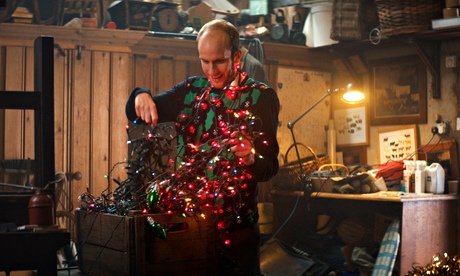For supermarkets the Christmas season represents a chance to boost sales and profits at a time when normal rules are suspended. According to market researchers Kantar, all of the top 5 UK supermarkets (with the exception of Asda) are losing market share. While gains have been made by Waitrose and small multiple stores, the biggest gainers are Lidl (up 18% in the latest quarter) and Aldi (27% higher in the same period).
 |
| Jools Holland in the 2014 Aldi advertisement Picture from MarketingMagazine |
Lidl's campaign for the end of 2014 is part of a much larger one, based around the theme of 'Lidl surprises'. The overall campaign (not just the Christmas part) is costing the company £20 million (according to The Grocer) - this looks impressive except when set against Tesco's spend last year of £25 million. Lidl, like other supermarkets this year, intend to get more value out of their advertising by linking it to social media and other channels.
The 'surprises' theme in the Lidl advertisement comes over in the reaction of the 'ordinary people' from Hertfordshire who are seen tucking into a Christmas meal prepared from Lidl groceries. There is surprise at being served lobster at the start, and stollen for dessert. Most of all, the diners are surprised to discover the provenance of the food: they had believed that it was from Waitrose or Marks & Spencer (both named in the film). This should come as no surprise as Lidl had named these as targets in the pre-publicity.
On social media Lidl has been promoting the campaign, and has succeeded in getting the advertisement seen nearly 300,000 times to date. Of course this is a small figure alongside the 12 million views that Sainsbury's has achieved. Lidl is far less active on Twitter than all its competitors with a mere 16,500 followers. Here there seems to be a great deal of confusion, with the official Twitter feed using numerous hashtags including #LidlChristmas, #Lidler and #LidlSurprises. The social media channels are very effective at getting over the 'surprising' new Christmas goodies in store.
Lidl has 750,000 Facebook fans, where is uses the same range of hashtags. The campaign launch was somewhat overshadowed by Lidl introducing what was popularly believed to be a "ban" on the use of any language but English by staff in Lidl stores.
Aldi, unlike most retailers in 2014, has opted to feature a celebrity: Jules Holland and his band appear at the end of commercial. The theme of the advertisement, "everyone's coming to us" is a witty poke at the way Aldi is growing at the expense of established competitors. The TV advertisement itself, launched on Novemer 5, is nowhere near as popular as Lidl's, gaining just 50,000 views to date, despite the celebrity endorsement. However the company outscores its German rival on Facebook with over 800,000 fans. It also has a far larger Twitter following. Both high scores are probably attributable to the company's successful ways at 'incentivizing' its fans with competitions and offers. There is just one mention of the TV campaign, though.
The success of Aldi and Lidl should not be overstated: much of it is attributable to locational effects - both firms are opening new stores steadily across the UK. Their campaigns in broadcast media and online stress product quality over low prices. But the market share figures speak for themselves: everyone is going to them.
